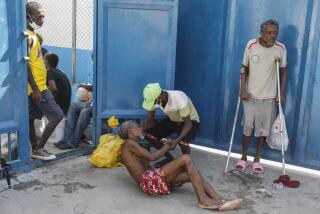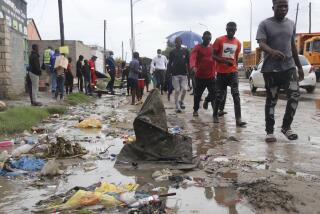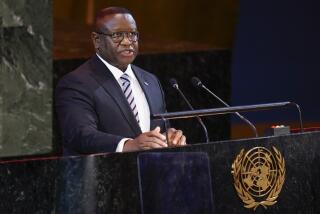Sierra Leone imposes three-day lockdown in bid to halt Ebola
Extraordinary times call for extraordinary measures, according to Sierra Leone’s leader, who ushered in a controversial three-day curfew across the entire country Friday in a bid to halt the deadly Ebola virus.
In a measure criticized by humanitarian agencies as punitive and counterproductive, Sierra Leone authorities have banned anyone from leaving their houses until midnight Sunday, so that health workers can go door to door to educate people about the virus and track down households that are concealing infected people.
The government has instructed 30,000 health workers and hastily trained volunteers to visit every house in the country, home to some 6 million people, in the space of just three days.
Humanitarian workers have harshly criticized the measure, saying it could do more harm than good, destroying relationships between the population and health authorities in a region where rumors are rife that the illness is an invention or conspiracy.
“It has been our experience that lockdowns and quarantines do not help control Ebola, as they end up driving people underground and jeopardizing the trust between people and health providers,” the medical charity Doctors Without Borders said in a statement when the curfew was proposed. “This leads to the concealment of potential cases and ends up spreading the disease further.”
The group, which has taken the lead on fighting Ebola in West Africa, has also been highly critical of the slow global response to the outbreak. More than 2,000 people had died before the United States and other countries and international agencies ramped up their response in recent days.
Sierra Leone is not alone in adopting tough measures as the number of infected people has soared in West Africa. The Liberian government quarantined an entire slum in the capital, Monrovia, sealing off its more than 50,000 residents for more than a week.
Authorities in five West African countries have reported more than 5,300 suspected and confirmed Ebola cases, including 2,600 deaths, according to figures released by the World Health Organization. Liberia, Sierra Leone and Guinea account for most of the cases.
The epidemic has placed the region’s ramshackle health systems under intense pressure and has devastated local economies.
The streets of the Sierra Leone capital, Freetown, were deserted Friday, and normally bustling markets were empty except for police, health workers and volunteers whose job it is to distribute soap, provide information and track down bodies and infected people, according to local news reports. Police roadblocks enforced the curfew.
“Today, the life of everyone is at stake, but we will get over this difficulty if we all do what we have been asked to do,” Sierra Leone President Ernest Bai Koroma said in a televised address late Thursday, shortly before the curfew took effect at midnight. “These are extraordinary times, and extraordinary times require extraordinary measures.”
He acknowledged that some of the measures were difficult but that people’s health and dignity was at stake. There is no vaccine or cure for Ebola, which is spread through contact with the bodily fluids of infected people and animals.
“Avoid touching each other, avoid eating bush meat, avoid visiting the sick, avoid attending funerals, report illnesses and deaths to the nearest health facility,” Koroma said, spelling out safety measures that in many cases run counter to local tradition and have fueled suspicion and distrust.
The outbreak, which was first reported in neighboring Guinea in March, has been marked by a massive communications failure, as global health authorities and West African governments delivered messages that terrified and alienated populations. In Sierra Leone, dozens of patients absconded, infecting others, often their own family members.
Many in the region feared reporting their symptoms to health authorities, because patients were placed in isolation and never seen again by their families.
In Liberia, a mob attacked a screening center in West Point last month, freeing patients. In Guinea, Doctors Without Borders reported it was unable to enter 10 villages because of hostility.
On Tuesday, eight members of a Guinean delegation sent to educate people about Ebola in the village of Womme, in the country’s southeast, were attacked and killed, their bodies thrown into latrines. The group included doctors, local government officials and journalists.
At least 562 people in Sierra Leone are believed to have died from Ebola, although the actual number could be higher.
Those going door to door in the country, including hastily trained volunteers, will likely have a difficult job working out which families are hiding sick people.
But some residents of Freetown support the campaign, hoping that it will stop the disease from spreading so fast.
“It will protect our country from this dangerous virus. Many of our people have died, nurses and doctors, too,” Ishmail Bangura told the Associated Press. “So if they ask us to stay home for three days, for me it is not bad.”
For news from Africa, follow @RobynDixon_LAT on Twitter
More to Read
Start your day right
Sign up for Essential California for news, features and recommendations from the L.A. Times and beyond in your inbox six days a week.
You may occasionally receive promotional content from the Los Angeles Times.






